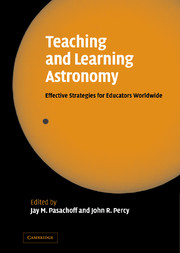Book contents
- Frontmatter
- Contents
- List of illustrations
- Preface
- Introduction
- Part I Astronomy in the curriculum around the world
- Introduction
- 1 Why astronomy is useful and should be included in the school curriculum
- 2 Astronomy and mathematics education
- Open discussion
- 3 Engaging gifted science students through astronomy
- Poster highlights
- Part II Astronomy education research
- Part III Educating students
- Part IV Educating teachers
- Part V Astronomy and pseudoscience
- Part VI Astronomy and culture
- Part VII Astronomy in developing countries
- Part VIII Public outreach in astronomy
- Part IX The education programs of the International Astronomical Union
- Part X Conclusions
- Author index
- Subject index
Poster highlights
Published online by Cambridge University Press: 18 May 2010
- Frontmatter
- Contents
- List of illustrations
- Preface
- Introduction
- Part I Astronomy in the curriculum around the world
- Introduction
- 1 Why astronomy is useful and should be included in the school curriculum
- 2 Astronomy and mathematics education
- Open discussion
- 3 Engaging gifted science students through astronomy
- Poster highlights
- Part II Astronomy education research
- Part III Educating students
- Part IV Educating teachers
- Part V Astronomy and pseudoscience
- Part VI Astronomy and culture
- Part VII Astronomy in developing countries
- Part VIII Public outreach in astronomy
- Part IX The education programs of the International Astronomical Union
- Part X Conclusions
- Author index
- Subject index
Summary
The topic of including astronomy as part of a general curriculum is first addressed by Nassim Seghouani in a poster entitled The project of teaching astronomy in Algeria. Seghouani mentions that there is currently no teaching of astronomy in Algeria despite a glorious history in this domain. The Algiers Observatory, constructed in 1890, participated since its creation in many international projects, and it was the leading observatory in the international project “Carte du Ciel.” Today, and since 1985, research in astronomy in Algeria has started up again, and the country has firmly decided to invest in this domain. New instruments have been acquired lately, such as an 80-cm telescope. The introduction of astronomy and postgraduate astronomy courses is currently in progress, along with wider aspects attached to this project. The organization of summer schools as well as the introduction of astronomy teaching in secondary schools is also discussed.
Further global perspectives are provided by representatives from many of the countries created upon the dissolution of the former USSR, including a paper by Elchin S. Babayev. Babayev and his colleagues describe the current situation of astronomy education in Azerbaijan. Azerbaijan has a long history of contributing to astronomy, and has an under-utilized astronomical treasure in the Maragha Observatory, located in the south of Azerbaijan, originally established in the Middle Ages by astronomer Nasiruddin Tusi.
- Type
- Chapter
- Information
- Teaching and Learning AstronomyEffective Strategies for Educators Worldwide, pp. 34 - 38Publisher: Cambridge University PressPrint publication year: 2005

